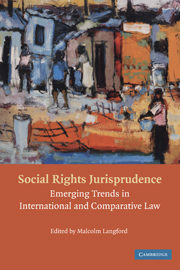Book contents
- Frontmatter
- Contents
- Foreword – Philip Alston
- Preface
- PART ONE OVERVIEW
- PART TWO SELECT NATIONAL JURISDICTIONS
- PART THREE REGIONAL PROCEDURES AND JURISPRUDENCE
- 17 African Regional Human Rights System
- 18 The Inter-American Commission on Human Rights
- 19 The Inter-American Court of Human Rights
- 20 European Court of Human Rights
- 21 The European Committee of Social Rights
- 22 European Court of Justice
- PART FOUR INTERNATIONAL HUMAN RIGHTS PROCEDURES AND JURISPRUDENCE
- PART FIVE SPECIAL TOPICS
- Notes on Contributors
- Table of Authorities
- Index
- References
20 - European Court of Human Rights
Sympathetic Unease
Published online by Cambridge University Press: 05 June 2012
- Frontmatter
- Contents
- Foreword – Philip Alston
- Preface
- PART ONE OVERVIEW
- PART TWO SELECT NATIONAL JURISDICTIONS
- PART THREE REGIONAL PROCEDURES AND JURISPRUDENCE
- 17 African Regional Human Rights System
- 18 The Inter-American Commission on Human Rights
- 19 The Inter-American Court of Human Rights
- 20 European Court of Human Rights
- 21 The European Committee of Social Rights
- 22 European Court of Justice
- PART FOUR INTERNATIONAL HUMAN RIGHTS PROCEDURES AND JURISPRUDENCE
- PART FIVE SPECIAL TOPICS
- Notes on Contributors
- Table of Authorities
- Index
- References
Summary
INTRODUCTION
In analysing the approach of the European Court of Human Rights to socio-economic rights, it is necessary to commence with a rejection of an overly simplistic taxonomy: the categorisation of rights as either social and economic or civil and political is an entirely artificial construct. It is simply not possible to differentiate (save in the loosest possible terms) between such assorted rights. There is no bright line that separates rights into two distinct categories – no rational, and precious little pragmatic, justification for such a divide.
The Strasbourg Court has, to its credit, rejected the argument that the European Convention on Human Rights is a treaty solely concerned with civil and political rights. As long ago as 1979, in one of its most significant judgments, Airey v. Ireland the Court held that:
[T]he mere fact that an interpretation of the Convention may extend into the sphere of social and economic rights should not be a decisive factor against such an interpretation; there is no water-tight division separating that sphere from the field covered by the Convention.
It follows that the ‘mere fact’ that a human rights violation is capable of being articulated in the language of socio-economic rights does not of itself mean that the Strasbourg Court will cede jurisdiction to the Executive. The Court nevertheless recognises that questions that concern the distribution of scarce resources are often better addressed by individual governments.
- Type
- Chapter
- Information
- Social Rights JurisprudenceEmerging Trends in International and Comparative Law, pp. 409 - 427Publisher: Cambridge University PressPrint publication year: 2009
References
- 1
- Cited by

